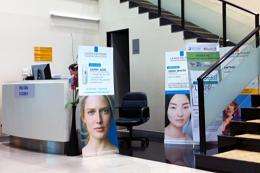Researchers set out to profile the nip, tuck, travel phenomenon

(Medical Xpress) -- An estimated 50 Australians a month are travelling to Malaysia for cosmetic surgery and researchers would like to know more about them as part of ground-breaking international study of the phenomenon of cosmetic surgery tourism.
The Sun, Sea, Sand and Silicone project involves academics from the University of Technology, Sydney, the University of Sydney and the Universities of Leeds and Leicester in the UK. It is examining two sites of origin – the UK and Australia – and five popular cosmetic surgery tourism destinations: Thailand, Korea and Malaysia, Spain and Poland.
Lead UTS researcher Dr. Meredith Jones said cosmetic surgery tourism was fast growing, but not yet well understood.
"Our project is aiming to bring understanding to the cosmetic surgery tourism industry by looking at the experiences of people involved: patients, surgeons, the agents who organize travel and appointments, and other workers such as nurses and translators," Dr. Jones said.
"We are asking why Australians are choosing to have cosmetic surgery, why they're choosing to have it in these places, how they know about the option to have surgery overseas, how they organise their trip, what they do while on their trip (besides surgery), who they go with, and what their perceptions are of the experience."
The Sydney team of Dr. Jones, Professor Elspeth Probyn from the University of Sydney and Emily Hunter from UTS, has already gathered data from people travelling to Thailand and now is looking at Malaysia.
Dr. Jones said interviews with the surgery tourists to Thailand had shown that many now travel in groups. Most of the groups are put together by cosmetic surgery tourism agents.
"We have also noted an increase in younger people, especially women in their twenties, travelling in order to have cosmetic surgery," she said.
"Social media, mainly Facebook and YouTube, are playing larger and more important roles. Through them people gain information, access to services, and are able to join communities of other cosmetic surgery tourists."
Ms. Hunter will spend five weeks doing fieldwork in Malaysia from 18 May and hopes make contact with Australians travelling there for surgery before they set off.
"The demographic seems to be different from those going to Thailand," Ms. Hunter said "These people are not in the same age group, or as active on web forums and social media, and there aren't as many of them.
"Our ideal is for people to keep a video or photo diary of the whole experience for us and that requires some interaction beforehand."
Ms. Hunter said the study, due to be completed late next year, was fully confidential with ethics approval from the universities involved.















